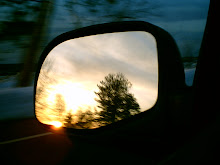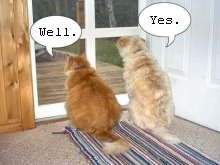 One might think life precarious enough without getting in a canoe with two old dogs, and one might be right. Then again, what's life without a little precariousness?
One might think life precarious enough without getting in a canoe with two old dogs, and one might be right. Then again, what's life without a little precariousness?The canoe is green, made of hard plastic, a Coleman three-seater. I sit in the middle. Buster, a 20ish-pound scruffy terrier mutt with a mind defiantly his own, sits directly in front of me. Queenie, a border collie mix, a perfect mix of sweet and smart yet nonetheless slightly off balance, sits behind me. Both dogs, indeed, are senior citizens.
Along with an old cat (who absolutely refuses to go canoeing) we live on a river that most days flows gently into Lake Superior. On a good north windy day, however, the flow reverses and the river floods with rippling swells, the water level rising rapidly. On sultry days the water level drops and stagnation sets in, the river becoming dull as an old penny, vainly dressing itself up with creamy yellow and white water lilies, their broad green pads beaded with sparkling blue damselflies. Long-legged water bugs dart through the lilies chasing gnats and mosquitoes, and the occasional frog pops up to zap either the pursuer or the pursued. A great blue heron may stop by to dine on frogs or minnows that slide through the grasses that border the river's island, a vaguely marshy spot rising up along the river's spine, and often a kingfisher alights on the remains of a sidelined craggy tree trunk. Ducks and geese and mergansers wander through in the spring, and if one pauses to look up, a bald eagle may pass by. The river is home to sun-basking turtles, beaver (one can paddle only so far upstream before being stymied by a dam), a cranberry marsh, and river otter.
It was two otters who caused consternation one day as I paddled to the lake with the dogs.
The otters were playing, diving down, bobbing up, and dunking each other at the head of the narrow channel that flows on our side of the island. Other than turning back my options were few, so even with otters directly in our path and Buster at the prow of our ship I paddled on, wary yet curious, thinking without much doubt that the otters would see us soon enough and swiftly disappear. But as we drew closer they continued to play and splash, oblivious to anything but their own fun. I now thought Buster would spot them at any moment and worried what he might do. Jump canoe? Stand up and bark? Cause a ruckus? Cause tippage? I stopped paddling but still we drifted closer and closer, otters playing, Buster gazing in their direction, me wondering, and Queenie ... who knows?
Then Buster spied the otters. We were barely 10 feet away. He scrambled to the front of the canoe, stood with his front paws on the bow. His body stiffened fore to aft. He growled low in his throat. His tail trembled. I reached forward and put my hand firmly on his back. He barely flinched. Those dang otters continued to play and we continued to drift toward them. Buster glanced down at the water, up at the otters. I said quietly: Don't think about it.
Meanwhile, behind me, Queenie had gotten wind of the situation. I'm not sure she actually saw the otters, but she and Buster take cues from each other, and she knew something was up. She was as far forward as she could get while remaining behind me, the lift of her ears and the thrust of her quivering snout bringing her well into the circle of excitement. Now, barely three feet from the otters and nary a second from capsize, the otters froze. Their slick brown heads, poked just above water, turned in our direction. They disappeared in an instant.
Buster could barely contain himself. Something - anything - disappearing below the surface, underground or underwater or undercover, is more tantalizing than he can bear. The canoe rocked as he whined and fussed, his nails scrabbling and clicking on the polyurethane. Queenie joined in, though I'm not sure she actually knew what it was all about.
In the end, the canoe stayed afloat and on to the beach we went.
The beach along the lake is our usual destination, and it is the final approach that can be most fraught with peril. We paddle under the M-28 bridge, a short tunnel opening onto sea air, which smacks the dogs right where they live - in their noses. The noses turn upward and begin to twitch frantically as if caught by a baited hook. What will we find on the beach today? What snacks? What delectables? What trails of old tales? Will it be gull poop or dead rotting fish? Scurrying crayfish or sea-soaked sun-bleached possum bones? For the dogs, the beach is an ever-changing depository; a cafeteria line of debris.
We beach the canoe at the mouth of the river where a fluctuating spit of sand develops, the river turning suddenly eastward before doubling back to merge with the lake. Every once in a while gulls squat on the spit and Queenie's excitement peaks - gull-chasing is her pure pleasure, and to see them sitting there, so nonchalant, so unsuspecting, is more than she can bear.
One day, with a gaggle of dallying gulls up ahead, I heard a soft whine behind me. The next thing I knew I was watching Queenie swim to shore, watching her pull herself out of the water, watching her barely able to stand she was so completely soaked but taking off at a dead run anyway, low to the ground, straight at the mob of sitting gulls. The gulls took flight. Buster and I sat there, stunned. The canoe had barely moved.



